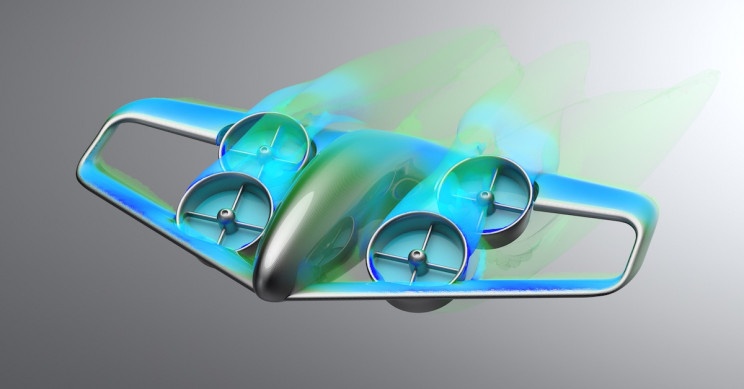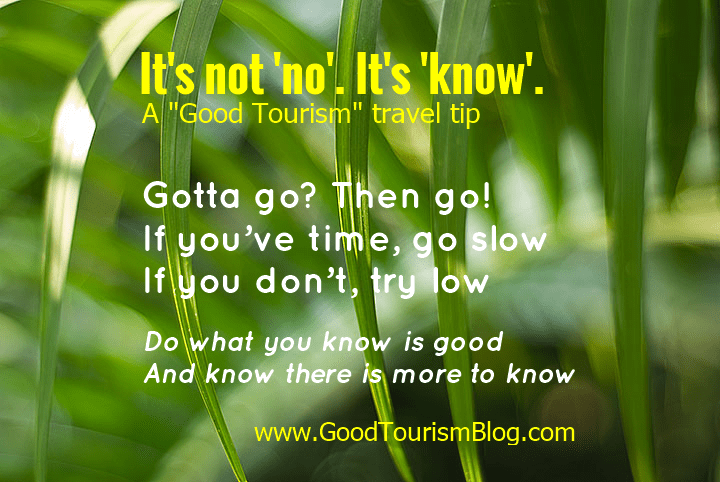Good news in tourism February 1 – 7, 2021

Because it’s the quicker picker upper …
Published most Sundays, “Good news in tourism” is the perfect pick-me-up for the start of a new week in travel & tourism … everyone’s business.
This week’s good travel & tourism news menu:
(Click / touch an item to go straight to it.)
- “Good Tourism” news & “GT” Insights
- Travel & tourism recovery strategies
- Don’t panic: Climate-friendly travel & tourism is coming
- Cultural heritage travel & tourism
- Nature-based & eco- travel & tourism
- Odds & ends
It’s “Good Tourism”. And go!
Keep up with “GT”
If you like “GT” and you don’t want to miss a thing, subscribe to “GT’s” free e‑news:
“Good Tourism” news & “GT” Insights
Readers of The “Good Tourism” Blog can look forward to monthly sustainable tourism stories from Laos. “GT” Destination Partner WeAreLao will soft-launch its “Sustainable Tourism Laos: Showcase” on Monday (February 8). WeAreLao will spotlight individual sustainable businesses through magazine-like feature stories that put a “face to a place”. “GT” is a key outlet for the Showcase.
Track of the Tiger TRD (Tourism Resources Development) is the latest “GT” Partner. Based in Chiang Mai, Thailand, Track of the Tiger develops tourism products that “protect and promote the cultures, customs, lifestyles, and environment of host countries” while ensuring communities receive “a more equitable share”. In May 2020, founder & CEO Shane K Beary wrote a “GT” Insight about his proposed alternative to travel & tourism’s all-powerful commission-based supply & distribution chains: “Supply lines: A former soldier’s take on tourism’s failure to win hearts & minds”.
An Arizona State University (ASU) economic impact study shows a US$ 4.85 : 1 return on investment in parks and recreation. Tanner C Knorr of “GT” Partners Second Look Worldwide and Off Season Adventures brought this to “GT’s” attention. Mr Knorr is a PhD candidate at ASU, and recently wrote a “GT” Insight on the importance of factoring well-being into land use and infrastructure policy: “Tourism infrastructure, well-being, & how to ‘build back better’ for all”.
In Cambodia, “GT” Partner Cardamom Tented Camp has joined the Future of Tourism Coalition. “As a signatory, we commit to place destination needs at the centre of our recovery strategies and do our part to build a better tomorrow for travel and tourism.”
“Did you know that there are many species of whale in California?” asks Kevin Phun of “GT” Partner The Centre for Responsible Tourism Singapore (CRTS). Join him at a virtual networking and whale watching event, March 20, at 1100 Singapore time (0300 GMT).

As has been widely reported, VisitScotland has joined other travel & tourism organisations in “declaring a climate emergency”. In his “GT” Insight published Tuesday, trends strategist Chris Greenwood shares the early developments of the Scottish national tourism board’s emergency response and its implications for stakeholders: “Why VisitScotland declared a climate emergency & what it means for tourism”
Travel & tourism’s fatal flaw is its total reliance on freedom of movement. Lockdowns and border closures in response to COVID-19 have blindsided tourism-dependent economies and devastated livelihoods. In his “GT” Insight published Thursday, sustainable tourism consultant Angelo Sciacca argues that small island destinations can be more resilient if stakeholders adopt the principles and practices of the circular economy. “From linear to circular: How to build resilience in small island tourism destinations”
The importance of good partnerships
Many commentators would like to see destinations recover from the COVID-19 depression focused on quality rather than quantity. That would be nice, of course, particularly if host communities want that. However, some or many extant tourism stakeholders will likely go out of business. Don’t let one of those be you.
Seek out good partnerships with those who make you their priority.
“GT” is a good partner. Please verify that with a “GT” Partner and then ask about partnership opportunities. There’s a partnership opportunity for everyone — big or small; public or private; commercial or not-for-profit — because travel & tourism is everyone’s business. All “GT” Partners enjoy: a 125 x 125 “Good Partner” button; input into “GT’s” curated list of worthy charitable causes “Friends indeed”; and the outstanding opportunity every week to contribute positive news items to these almost-famous “Good news in tourism” posts and/or the “GT” newsletter.
Travel & tourism recovery strategies
The Tourism Authority of Thailand is getting SEXY and putting out … its tourism recovery strategy. SEXY = Safety and hygiene; Environmental sustainability; eXtra experiences; and Yield. TAT governor Yuthasak Supasorn said: “All four key focuses under this ‘SEXY’ tourism concept reflect Thailand’s current new normal tourism direction towards safe and sustainable travel.”
The Hawaii Tourism Authority has published the “community-based” Kauai Destination Management Action Plan (PDF; hosted offsite). HTA is working on plans for each of the three other counties in the US state. Created as “a guide to rebuild, redefine, and reset the direction of tourism”, the Kauai plan was developed by a steering committee representing community, business, including the visitor industry, and the County of Kauai and Kauai Visitors Bureau.
On the US mainland, the town of Frisco, Colorado has started to talk about the long-term impacts of COVID-19 and the “new realities” of tourism trends. A think tank is leading discussions about economic and social changes and what steps should be taken.
In a new ad promoting his city, the mayor of Moose Jaw, Saskatchewan, Canada, pokes fun at Canadian politicians who have travelled overseas for their holidays. Fraser Tolmie offers a cheeky tip for other elected officials: “I’m notoriously lucky, because I don’t need to take the heat to get away from it all. Why? Because we have it all right here in Canada’s most notorious city.” Moose Jaw is not the only city in Saskatchewan province targeting the domestic market.
Croatia’s Ministry of Tourism & Sport will launch its “Safe Stay in Croatia” campaign in mid-February. The campaign will highlight COVID-related health and safety protocols employed by tourism stakeholders in the destination.
Support “GT”
If you find “GT” inspiring, interesting, somewhat amusing, or at least different then surely it’s worth a little something to you.
It means a huge something to “GT”. Thank you very much to those who have donated. 😍
Don’t panic: Climate-friendly travel & tourism is coming
US congresswoman Julia Brownley has reintroduced legislation to “incentivise” the production and use of sustainable aviation fuel (SAF). Its goal is to cut US aviation greenhouse gas emissions 35% by 2035 and achieve net-zero by 2050. Among other things, the legislation allocates US$ 1 billion in funding for projects that produce, transport, blend, or store SAF …
… which is fantastic news, especially for those who can tap taxpayers’ hard-earned to reduce their own financial risk. Meanwhile, the real incentive is market share and sustained commercial success.
A complex business ecosystem is growing and evolving that even the most competent government couldn’t conceive, let alone command or control. So when it comes to climate-related concerns, urgencies, or even emergencies, let us not panic. Let’s not give too much credit to our dear leaders for progress made. Let’s certainly not concede too much power to them.
Businesses in the USA and around the world, from startups to multinationals and everything in between, are staking large sums in the race to fill the demand of the transport sector for low-carbon, carbon-neutral, low-GHG, and/or net-zero sources of fuel, and to establish markets for the trade in these fuels. Other ventures are competing to offer user-friendly applications that help the rest of us offset our emissions.
Here are some newsy examples from the week that was …
Oxy Low Carbon Ventures (OLCV), a division of US-based Occidental, announced the delivery of two million barrels of “carbon-neutral oil” to Reliance Industries in India. OLCV claims that it was the “first major petroleum shipment for which greenhouse gas emissions associated with the entire crude lifecycle have been offset”. Facilitated by Australia’s Macquarie Group, the transaction was the first step toward creating a new market for “climate-differentiated crude oil” and the eventual development of “net-zero oil”.
Rolls-Royce has conducted tests of 100% sustainable aviation fuel (SAF) in a business jet engine, the Pearl 700, in Dahlewitz, Germany. The company has also tested unblended SAF in a Trent 1000 engine in Derby, England. The tests show that “current engines for large civil and business jet applications could operate with 100% SAF as a full ‘drop-in’ option”. The SAF used was from World Energy in California, USA.

US airline United is integrating atmospheric carbon removal into its net-zero-by-2050 strategy by backing direct air capture (DAC) technology. United has invested in 1PointFive, which plans to build a large-scale DAC plant in Texas to “permanently sequester one million tons of [CO2] every year”. If powered by renewable energy, DAC tech can be “up to a hundred times more efficient than a forest” at sucking up CO2, according to Jennifer Wilcox of the University of Pennsylvania and the Department of Energy. Furthermore, captured C can be combined with green hydrogen — H that is made from renewable energy — to produce a sustainable aviation fuel.
US fractional private jet firm NetJets has bought a 20% stake in WasteFuel and undertaken to purchase 100 million gallons (378.5 million litres) of their sustainable aviation fuel (SAF) over 10 years. WasteFuel is developing a plant in the Philippines with the capacity to convert one million tons of municipal waste into 30 million gallons (113.6 million litres) of SAF a year. Production is expected to begin in 2025.
Japan Airlines (JAL) has operated a commercial flight from Tokyo to Fukuoka using sustainable aviation fuel blended with regular fuel.
A solid biofuel sourced from farms has propelled a six-metre rocket to an altitude 1,219 metres over Maine, USA. The prototype rocket by bluShift Aerospace is in the race to capture the nano satellite launch market. The proprietary biofuel is not only carbon-neutral but also nontoxic, claims bluShift boss Sascha Deri. “I could give it to either one of my little daughters. Nothing bad would happen to them, I swear.”
Greenhouse gas emissions from corn ethanol are 46% lower than petroleum, according to a new US report (PDF; hosted offsite) in Environmental Research Letters.
Garage-based online bookseller turned corporate tech giant, Amazon.com, has “ordered hundreds of trucks that run on compressed natural gas as it tests ways to shift its US fleet away from heavier polluting trucks”.
Tesla has helped make electric vehicles desirable. The US-based company has built a successful business out of not only the sporty electric cars it manufactures but also the clean energy solutions they need to be fit for purpose. Now it seems Tesla’s co-founder and CEO Elon Musk thinks designing an electric aircraft would be an “exciting challenge”. He reckons the requisite battery technology is only a few years away.
Technology startups have sprung up to develop application programming interfaces (APIs) and applications to help consumers and businesses of all sizes examine and reduce their environmental footprints.

UK multinational GKN Aerospace has released the design for its Skybus, which it submitted as part of the Future Flight Challenge. The concept is an electric vertical take-off & landing (eVTOL) craft capable of carrying up to 50 city commuters on short hops.
Sustainable tourism & responsible travel is everyone’s business
Freedom of movement is a basic human right. And the travel & tourism industry is everyone’s business. “Everyone” includes not only those who earn a living from the travel & tourism industry, but also people who travel, and people who live in places travelled to and through. EVERYONE. Please share “Good news in tourism” with your friends and colleagues. And dive deeper into “Good Tourism” Insights for ideas on how to make sustainable tourism and responsible travel better … for you, for your people, and for your place. For they are your people. And it is your place.
Cultural heritage travel & tourism
To promote cultural heritage tourism in their country, four 2020 Miss Nepal pageant winners went on a heritage walking tour “into different chowks and bahas of Patan”. It was the second tour for the young women after a similar walk in Nepal’s capital Kathmandu a week earlier. And it won’t be the last. The organisers are planning on taking them to various heritage sites around the country. Miss Tourism 2020 Riya Shrestha said: “The walk made me realise that I was unaware of so many things of our own culture”.
The Louisiana Office of Tourism celebrated the launch of the Louisiana Civil Rights Trail. The Louisiana Civil Rights Trail focuses on the events of the 1950s and ‘60s that put the state at the centre of the USA’s Civil Rights Movement.
The Colorado Tourism Office and local tourism officials across the Canyons & Plains region of Colorado, USA are putting together events to mark 200 years of the Santa Fe Trail. “America’s first international highway”, the Trail was an important trade route between the US and Mexico. Organisers of the bicentennial are encouraging history buffs to follow the Santa Fe Trail “to relive the past and visit historic sites along the way”.
To boost tourism and “cultural renaissance” in Uttar Pradesh, India the state government led by chief minister Yogi Adityanath has announced the construction of 1,038 new platforms along the Ganges river for the devotional ritual Ganga aarti. Meanwhile, Maharashtra’s state tourism department is putting on 20 small cultural festivals through February and March.

While the role of Bangkok’s main train station Hua Lamphong remains uncertain, the good news is that the 105-year-old landmark is likely to remain standing. The State Railway of Thailand (SRT) wants to move Hua Lamphong’s interprovincial train services to Bang Sue Grand Station later this year. But the State Railway Workers’ Union doesn’t like that plan. If SRT has its way with Hua Lamphong, it is reportedly keen on converting the Italian Neo-Renaissance-style structure into a museum.
Friends indeed
“Friends indeed” are worthy travel & tourism industry fundraisers and charitable causes. Please help if you can. Share the page with your social networks. And link to it from your website or email signature.
Nature-based & eco- travel & tourism
Ministers from the 42 Union for Mediterranean (UfM) countries have agreed to set up new joint projects on “a wide range of issues”, including nature-based tourism.
Cyprus’ mountain resort revamps and rural glamping projects were attracting new investment even before COVID-19. “This interest has not faded with the pandemic,” Commissioner for rural communities Costas Champiaouris said. Restrictions may have “pushed people to mountain areas for entertainment”.
A group of Pardhi youths in India’s Madhya Pradesh state will soon begin “advanced training in ecotourism activities”. Before the SARS-CoV‑2 pandemic the youths worked as tourist guides in the Panna Tiger Reserve. It wasn’t very long ago, allegedly, that their nomadic tribe hunted tigers to extinction in the area.
Zimbabwe’s Environmental Management Agency has identified wetlands for conservation and ecotourism development in Matabeleland South province.
Odds & ends
Bits ‘n pieces that don’t necessarily fit into this week’s arbitrary clusters:
Mersing District Council in Johor, Malaysia has published the first issue of Mersing Kita, the newsletter of the Sustainable Travel Mersing (STM) project. The five-year STM initiative aims to help stakeholders, including Mersing residents, “create a transformative sustainable tourism industry”.
Philippines’ tourism workers from “non-accredited but government-licensed establishments”, whatever that means, may now apply for COVID-19 financial aid, the Department of Tourism (DOT) announced Thursday.
Stay healthy, smile, have a good week … And when you can travel again, remember:

It’s not ‘no’. It’s ‘know’.
Featured image (top of post): Sunrise over Bela krajina, Slovenia. By Uroš Novina (CC BY 2.0) via Wikimedia.
Donations, diversity, disclaimers
To help your correspondent keep his energy-efficient lights on, please consider a private one-off gift or ongoing donation. THANK YOU to those who have! 😍
You are a tourism stakeholder — yes, YOU! — so what’s your view? Do you disagree with anything you have read on “GT”? Join the conversation. Comment below or share your “Good Tourism” Insights. Diversity of thought is welcome on The “Good Tourism” Blog. And you will be supporting an independent publisher with your original content.
Disclaimer 1: It is “GT’s” policy to fully disclose partner/sponsor content. If an item is not disclosed as partner or sponsor-related then it will have caught “GT’s” attention by some other more organic means. Partner with “GT”. You know you want to.
Disclaimer 2: None of the stories linked from this week’s post have been fact-checked by “GT”. All terminology used here is as the linked sources used it according to the knowledge and assumptions they have about it. Please comment below if you know there has been buzzword-washing or blatant nonsense relayed here, but be nice about it. As for “GT” bringing it to your attention for you to set the record straight, you’re welcome! 🙂








